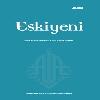Klasik Dönemde Kur’an’da Neshi Reddeden Bir Müfessir: Safedî’nin Nesh Teorisine Yaklaşımı
Tefsir ilminin en önemli meselelerinden biri olarak nesh erken dönemlerden beri tartışılmıştır. Hem klasik hem de çağdaş araştırmalarda, Kur’an’da neshin varlığına dair ittifakın bulunduğu söylenir. Kur’an’da neshin var olduğu kabulüne itiraz eden kişi olarak da sadece Ebû Müslim el-İsfahânî’den (öl. 322/934) bahsedilir. Günümüzde, bu iddiayı sorgulamayı gerektiren yeni bir tefsir neşredilmiştir. Klasik dönem müfessiri olan Safedî (öl. 696/1296) Keşfu’l-esrâr ve hetkü’l-estâr isimli tefsirinde İsfahânî’niyle birlikte kendisi de Kur’an’da neshi reddeder. O, ayrıca bedâ düşüncesini gerektirdiğin-den dolayı neshi bütünüyle reddeden Müslümanlardan ve neshi sadece önceki kitapla-ra hasrederek Kur’an için mümkün görmeyen Nevbahtî’den (öl. 310/922[?]) de bah-seder. Bunlara ilaveten tespitlerimize göre tâbiînden Ubeyd b. Umeyr’in (öl. 74/693[?]) de neshi kabul etmediği nakledilir. Böylece Kur’an’da neshin reddedilmesi hususunda klasik dönemde İsfahânî’nin tek olmadığı anlaşılmıştır.
A Commentator of Classical Period Who Rejected Naskh in the Qur’ān: al-Ṣafadī’s Approach to the Theory of Naskh
Abrogation (naskh), as one of the most important issues in tafsīr, has been discussed since the early periods. There is a consent on the existence of abrogation in Qur’ān both in classical and modern studies. Abū Muslim al-Iṣfahānī (d. 322/934) is the only person to be mentioned to object to the consent on the existence of abrogation in Qur’ān. Today, a new tafsīr has been published in order to question this claim. A clas-sical mufassir, al-Ṣafadī (d. 696/1296), rejects the existence of abrogation in Qur’ān in his tafsīr titled Kashf al-asrār wa hatq al-astār alongside with al-Iṣfahānī. He also mentions Muslims who completely reject abrogation since it requires badā (versatility or muta-bility of God) and al-Nawbakhtī (d. 310/922[?]) who thinks abrogation is not possible in Qur’ān by restricting its existence to earlier holy books. In addition, according to our findings, ‘Ubayd b. ‘Umayr (d. 74/693[?]) from tābi‘ūn is mentioned to have rejec-ted abrogation. Therefore, it was understood that al-Iṣfahānī was not the only one to have rejected the existence of abrogation in Qur’ān in the classical period.
Keywords:
Tafsīr, al-Ṣafadī, Kashf al-asrār, Naskh, Qur’ān, al-Iṣfahānī, Controversy,
___
- Albayrak, İsmail. “İbâdî Tefsir Usulüne Genel Bir Bakış”. EKEV Akademik Dergi 19/61 (2015), 31-62.
- Basrî, Ebü’l-Hüseyin. el-Mu‘temed fî usûli’l-fıkh. thk. Muhammed Hamidullah. 2 cilt. Dı-maşk: el-Ma‘hedü’l-‘İlmî, 1964.
- Cessâs, Ebû Bekir er-Râzî. el-Fusûl fi’l-usûl. thk. Uceyl Câsim en-Neşmî. 4 cilt. Kuveyt: Vizâratü’l-Evkâf, 1994.
- Cessâs, Ebû Bekir er-Râzî. Ahkâmu’l-Kur’ân. thk. Muhammed es-Sadık el-Kamhâvî. 5 cilt. Beyrut: Dâru İhyâi’t-Türâsi’l-Arabî, 1996.
- Cüveynî, İmamü’l-Harameyn. et-Telhîs fî usûli’l-fıkh. thk. Abdullah Cevlem en-Nîbâlî- Beşîr Ahmed el-Ömerî. 3 cilt. Beyrut: Dâru’l-Beşâiri’l-İslâmiyye, 1996.
- Gazzâlî, Ebû Hâmid. el-Müstasfâ min ‘ilmi’l-usûl. thk. Hamza b. Züheyr Hâfız. 4 cilt. Cidde: eş-Şirketü’l-Medineti’l-Münevvere, t.s.
- İbn Âşûr, Muhammed et-Tâhir. Tefsîru’t-tahrîr ve’t-tenvîr. 30 cüz. Tunus: Dâru Sahnûn, ts.
- İbn Kesîr, Ebü’l-Fidâ. Tefsîru’l-Kur’âni’l-‘Azîm. thk. Sami b. Muhammed. 8cilt. Riyad: Dâru Tayyibe, 1999.
- İltaş, Davut. Klasik Nesih Teorisi ve Çağdaş Tefsirciler. Ankara: Ankara Okulu, 2016.
- Kutsal Kitap. İstanbul: Kitab-ı Mukaddes Şirketi, 2009.
- Kureşî, Muhyiddin. el-Cevâhiru’l-muziyye fî tabakâti’l-hanefiyye. thk. Abdulfettâh el-Hulv. 5 cilt. Kâhire: Dâru Hicr, 1993.
- Mâtürîdî, Ebû Mansûr. Te’vîlâtü Ehli’s-sünne. thk. Fatma Yusuf el-Haymî. 5 cilt. Beyrut: Müessesetü’r-Risâle, 2004.
- Nehhâs, Ebû Ca‘fer. en-Nâsih ve’l-mensûh. thk. Süleyman b. İbrahim. 3 cilt. Riyad: Dâru’l-‘Âsıme, 2009.
- Özdeş, Talip. Kur’an ve Nesih Problemi. Ankara: Fecr Yayınları, 2. Baskı, 2018.
- Râzî, Fahreddîn. Mefâtîhu’l-ğayb. 32 cilt. Beyrut: Dâru’l-fikr, ts.
- Safedî, Cemâleddîn Yusuf b. Hilâl. Keşfu’l-esrâr ve hetkü’l-estâr. thk. Bahattin Dartma. 5 cilt. İstanbul: İSAM Yayınları, 2019.
- Serahsî, Şemsüleimme. Usûl. thk. Ebü’l-Vefâ el-Afkânî. 2 cilt. Beyrut: Dâru’l-Kütübi’l-‘İlmiyye, 2015.
- Şevkânî, Muhammed. İrşâdu’l-fuhûl ilâ tahkîki’l-hakk min ‘ilmi’l-usûl. thk. eş-Şeyh Ahmed İzv. 2 cilt. Dımaşk: Dâru’l-Kütübi’l-‘Arabî, 1999.
- Türcan, Selim. Neshin Problematik Tarihi. Ankara: Otto Yayınları, 2017.
- Vercilânî, Ebû Ya‘kub. el-Adl ve’l-insâf fî ma‘rifeti usûli’l-fıkh ve’l-ihtilâf. 2 cilt. Umman: Vuzâratu’t-Turâs, 1984.
- Zehebî, Muhammed. Siyeru A‘lâmi’n-nübelâ. thk. Memun es-Sağırcî. 25 cilt. Beyrut: Müessesetü’r-Risâle, 1984.
- Zürkânî, Muhammed Abdülazim. Menâhilü’l-‘irfân fî ‘ulûmi’l-Kur’ân. thk. Fevvaz Ahmed Zemerli. 2 cilt. Beyrut: Dâru’l-Kitâbi’l-‘Arabî, 1995.
- Zeyd, Mustafa. en-Nesh fi’l-Kur’ani’l-Kerîm. 2 cilt. Mansûra: Dâru’l-Vefâ, 3. Baskı, 1987.
- ISSN: 1306-6218
- Yayın Aralığı: Yılda 4 Sayı
- Başlangıç: 2006
- Yayıncı: Anadolu İlahiyat Akademisi
Sayıdaki Diğer Makaleler
Kur’ân Tefsirinde Sahabenin Rey Yaklaşımı
Klasik Dönemde Kur’an’da Neshi Reddeden Bir Müfessir: Safedî’nin Nesh Teorisine Yaklaşımı
Şiî Usûl Düşüncesinde İctihad Bağlamında Muâz Hadisinin Değeri
Ebû Hüreyre’nin Fakihliği Meselesi
İslam Hukuk Usulünde Müşterek Lafzın Manaya Delaletine Dair Tartışmalar
Bakara Sûresi 183-185. Âyetler Çerçevesinde Ramazan ve Orucun İşârî Yorumu
Ahlâk ve Siyasetin Belirleyici İlkesi Olarak Adalet: Mâverdî Merkezli Okuma
